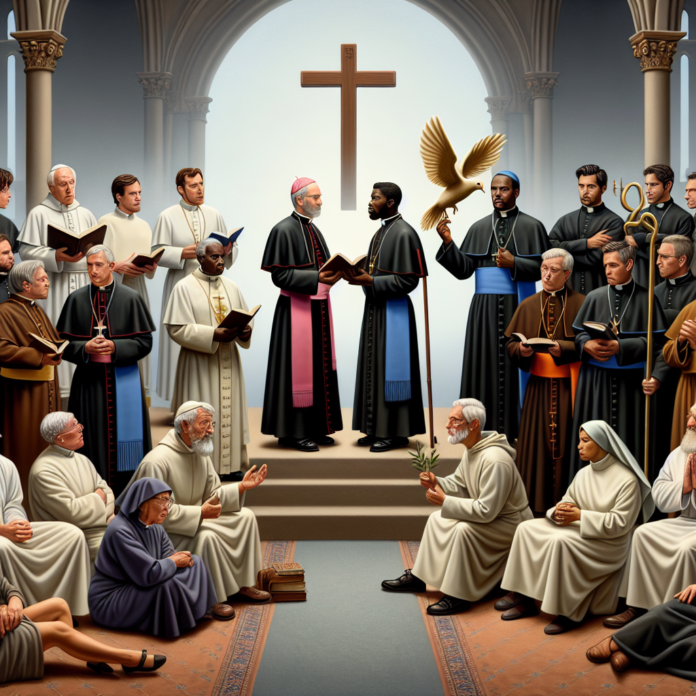Disputes over the Interpretation and Application of Catholic Social Teaching Among Contributors to Crisis Magazine
In the often-turbulent world of Catholic media, few magazines have sparked as much debate and division as Crisis Magazine. This conservative publication, founded in the early 1980s by Ralph McInerny and Michael Novak, bills itself as a bastion of traditional Catholic thought. Yet, within its pages, a contentious battle rages over the interpretation and application of Catholic social teaching. At the heart of this conflict lies a stark divide between traditionalists, who advocate for a rigid, pre-Vatican II interpretation, and more progressive voices who seek to apply the Church’s teachings in a contemporary context. This rift exposes fundamental disagreements about the Church’s role in modern society and raises critical questions about the future of Catholic social teaching.
Historical Context
To understand the ferocity of these disputes, one must first appreciate the historical context. The Catholic Church has a rich tradition of social teaching that dates back to Pope Leo XIII’s 1891 encyclical, Rerum Novarum, which addressed the conditions of the working classes in the wake of the Industrial Revolution. Subsequent Popes built on this foundation, emphasizing human dignity, the common good, and the preferential option for the poor. These teachings offered a comprehensive vision for a just society that was neither capitalist nor socialist but sought to balance individual rights with communal responsibilities.
However, the Second Vatican Council (1962-1965) marked a significant shift in the Church’s approach. The Council emphasized engagement with the modern world, introducing reforms that aimed to make the Church more responsive to contemporary issues. This move was met with resistance from traditionalists who viewed these changes as a dangerous departure from established doctrine.
The Crisis Magazine Divide
In the pages of Crisis Magazine, this historical tension plays out in vivid detail. Traditionalist contributors often argue for a return to a pre-Vatican II paradigm, where the Church’s authority is unquestioned, and its teachings are applied without consideration for modern complexities. They criticize progressive interpretations of Catholic social teaching as being overly accommodating to secular values.
A frequent target of traditionalist ire is the concept of social justice. While the Church has long championed the rights of the poor and marginalized, traditionalists in Crisis Magazine often argue that modern interpretations of social justice are too closely aligned with leftist political agendas. They claim that efforts to address economic inequality or promote social welfare are thinly veiled attempts at secularizing the Church’s mission.
Misguided Traditionalism
The obstinate stance of these traditionalists is not merely a matter of theological preference; it has significant real-world implications. By insisting on a narrow, antiquated interpretation of Catholic social teaching, traditionalists undermine the Church’s capacity to address the pressing issues of our time. Take, for instance, the issue of climate change. Pope Francis’ encyclical Laudato Si’ underscores the moral imperative to care for our common home and calls for substantial action to combat environmental degradation. Traditionalist contributors to Crisis Magazine dismiss such concerns as ideological distractions, thereby ignoring the Pope’s call for ecological stewardship as an integral part of Catholic social teaching.
Moreover, traditionalists often resist efforts to address systemic racism. They argue that such initiatives are influenced by secular notions of justice and equality, which they claim are incompatible with Catholic tradition. This resistance not only alienates many Catholics who see the fight against racism as a moral obligation but also disregards the Church’s own teachings on human dignity and solidarity.
The Cost of Resistance
The intransigence of traditionalists within Crisis Magazine carries a steep cost. By clinging to an outdated framework, they risk rendering the Church irrelevant in the eyes of many contemporary Catholics. Young people, in particular, are increasingly disillusioned with an institution that seems more interested in preserving its past than addressing the future. This disconnect is evident in the declining number of young Catholics who see the Church as a meaningful force for social justice.
Furthermore, the traditionalist approach undermines the Church’s credibility on social issues. When Catholic leaders and thinkers fail to engage constructively with modern problems, they cede moral authority to secular voices, diminishing the Church’s influence in public life.
A Call for Renewal
If Catholic social teaching is to remain a vibrant and transformative force, it must be interpreted and applied in a way that resonates with contemporary realities. This does not mean abandoning core principles but rather embracing a dynamic, responsive approach that considers the complexities of the modern world. Crisis Magazine has the potential to be a platform for such engagement, but only if it moves beyond the narrow confines of traditionalism.
In conclusion, the disputes over Catholic social teaching within Crisis Magazine reflect broader tensions within the Church. Traditionalists, with their rigid, outdated views, hinder the Church’s ability to navigate the complexities of the modern world. By clinging to a bygone era, they risk alienating future generations and diminishing the Church’s moral authority. It is time for a renewal of Catholic social teaching—one that remains faithful to its principles while courageously addressing the challenges of our time.
